IOS Condolence Meet to Pay Tribute to A.G. Noorani
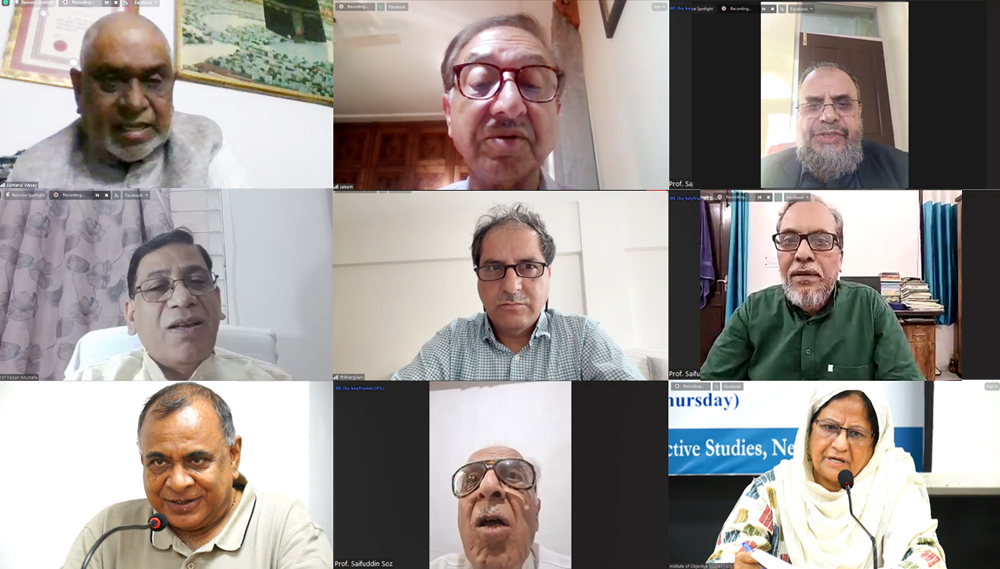
IOS Condolence Meet to Pay Tribute to A.G. Noorani
New Delhi: A condolence meeting was organised by the Institute of Objective Studies on September 12, 2024 at its auditorium to mourn the death of the lawyer, scholar, constitutional expert, political commentator, author, journalist and a recipient of the IOS Lifetime Achievement Award, A.G. Noorani, who passed away in Mumbai recently at the age of 93. A fairly good number of his admirers, scholars and journalists gathered to pay homage to him.
The program started with recitation of a Verse from the Holy Qur’an by Hafiz Asif Jamal from the Urdu section of the Institute.
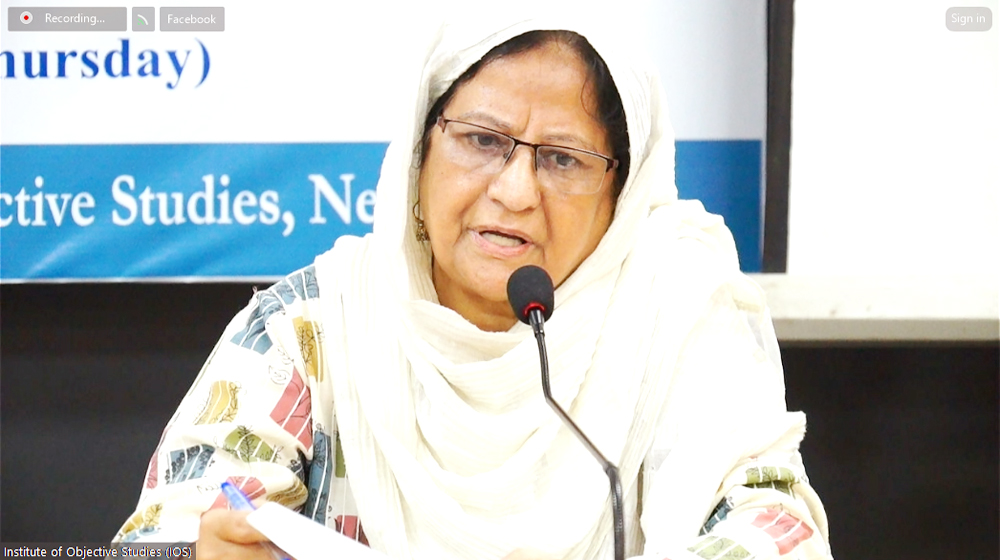
Vice-chairperson of the institute, Prof. (Ms.) Haseena Hashia, who conducted the proceedings, briefly spoke about the life and contribution of A.G. Noorani. She described him as a “mobile encyclopaedia”. He was a lawyer, political commentator, journalist and a writer. To top it all, he was a bold and non-conformist personality. He was awarded the Sixth IOS Lifetime Achievement Award for his contribution in the field of prolific writing and expert comments on topical issues. His book on Kashmiris is still regarded as standard work on the hill state, she said.
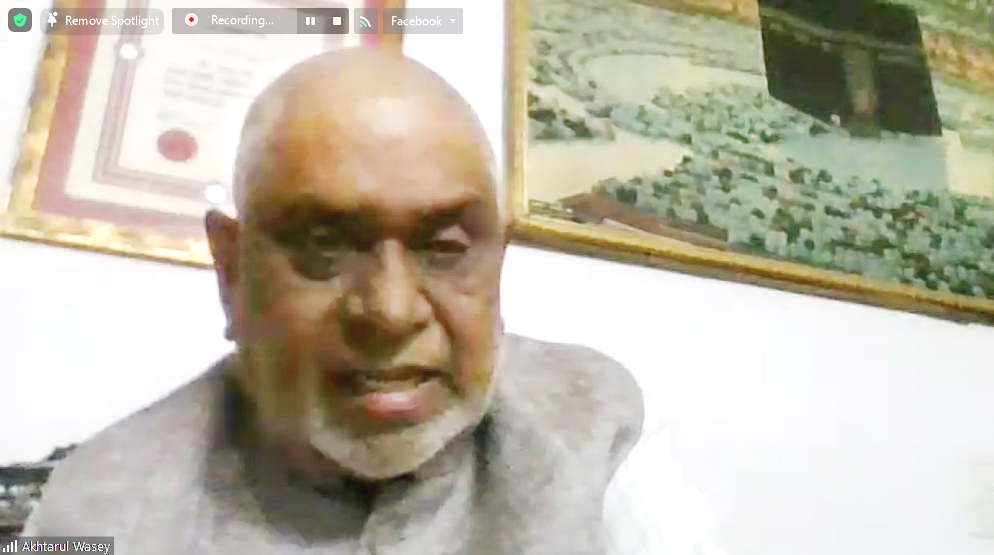
Paying tribute to A.G. Noorani, Professor Emeritus of Islamic Studies, Jamia Millia Islamia, Prof. Akhtarul Wasey, held that he was an extra-ordinary person who was born in Mumbai and was also laid to rest there. He was an author who possessed facts on which he built up his works. He wrote on the RSS and Kashmir with facts and figures. Whatever he wrote, he did it with boldness. He remained unmarried throughout his life and treated the country as his family. He said that Noorani was a self-respecting person who never went to Delhi even on the invitation of Mrs. Indira Gandhi. He was always armed with facts and never compromised on principles. Once he was invited by the late Sayyid Hamid to speak on Sirah. His speech was so enchanting that it held the audience spell-bound. He always used facts and proofs to support his contention while writing an article or a book. He was a regular contributor to several newspapers and magazines, including the Frontline. He brought to the fore the facts which were unassailable. Though Noorani was no more in the world, his work was alive, he added.
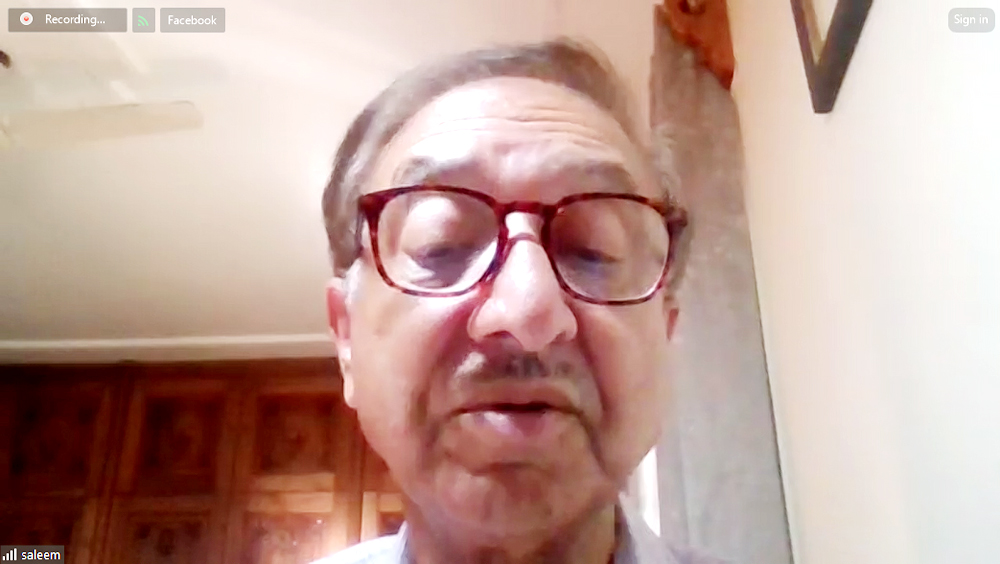
Former director-general of Jammu and Kashmir tourism, Mohammad Saleem Beg held that Noorani’s admirers were still not less in number. He was a lawyer, historian, political activist and a journalist. He was a well-wisher of Kashmir and the Kashmiris loved him so much. His views on Kashmir were truly authentic and dynamic. Kashmiris owed an obligation to him. He said that in Noorani, Kashmiris saw a pleader who spoke on their behalf. Kashmiris would always remain grateful to him. Nobody was as sincere for the Kashmiris as he had an interface with truth and always support it. He was of the view that the Kashmiris did not make out their cause properly. He also believed that the Pakistanis were casual in their approach. He was undeterred from speaking the truth. He described Noorani as a person to fundamentally speak truth. He was very fond of Kashmiri dishes. While in Delhi, he never skipped ‘Nihari’ from a particular hotel in the walled city. He loved food wherever it was available. In this respect, he was very versatile. His mental disposition was very tough, Beg remarked.
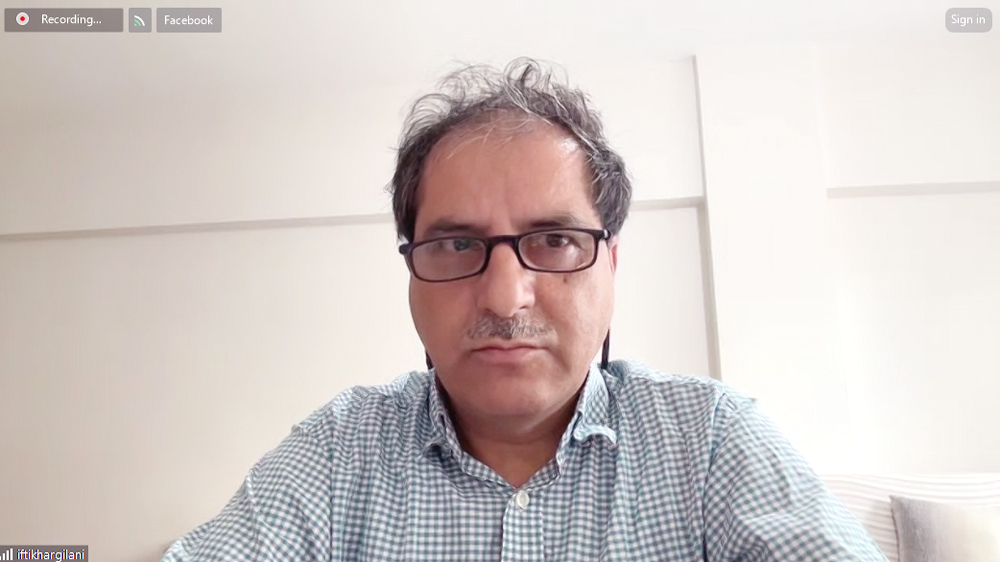
Senior journalist based in Turkey, Iftikhar Gilani, observed that Noorani was a regular contributor to the Frontline and Outlook. He died at the age of 93 years and wrote a total of 21 books. He wrote 800 articles for fortnightly English magazine Frontline alone. Besides, he regularly wrote for several newspapers. He said that 93 years were not enough to read whatever he wrote. He came into contact with Noorani in 1993 and worked as a researcher for some of his books. His journey of writing never took a stop. His association with Kahmir dated back to the days of Sheikh Abdullah when he was at the helm. He recalled how Mridula Sarabhai, the sister of the then chairman of the Atomic Energy Commission, Vikram Sarabhai and a congress leader, engaged Noorani to appear for Sheikh Abdullah in the apex court as his counsel. Kashmiris believed that their ideology had resemblance with his ideas on Kashmir. He had a dynamic stand on the Kashmir issue.
Gilani pointed out that Noorani had briefed Brajesh Mishra, National Security Advisor and principal secretary to the Prime Minister, Atal Bihari Vajpayee on Kashmir. He was fond of delicious food. He was a morose and did not like to engage in unnecessary conversation. He had said that he owed a debt and wanted to pay off by completing the third volume of his book on Babri Masjid. He exposed Pakistan on her China policy. So many things would have been laid bare, had the second volume of his book on India-China border dispute been completed. It is a matter of regret and dismay that Muslim scholars by and large ignored him and did not give him due recognition. He was all praise for the IOS chief patron, Dr. M. Manzoor Alam for honouring him with the IOS Lifetime Achievement Award. He also praised the All India Majlis-e-Ittehadul Muslimeen (AIMIM) chief Asaduddin Owaisi, M.P., for taking care of Mr. Noorani. He made a living by the royalty he received from his books. He concluded saying that the Millat cold-shouldered him.
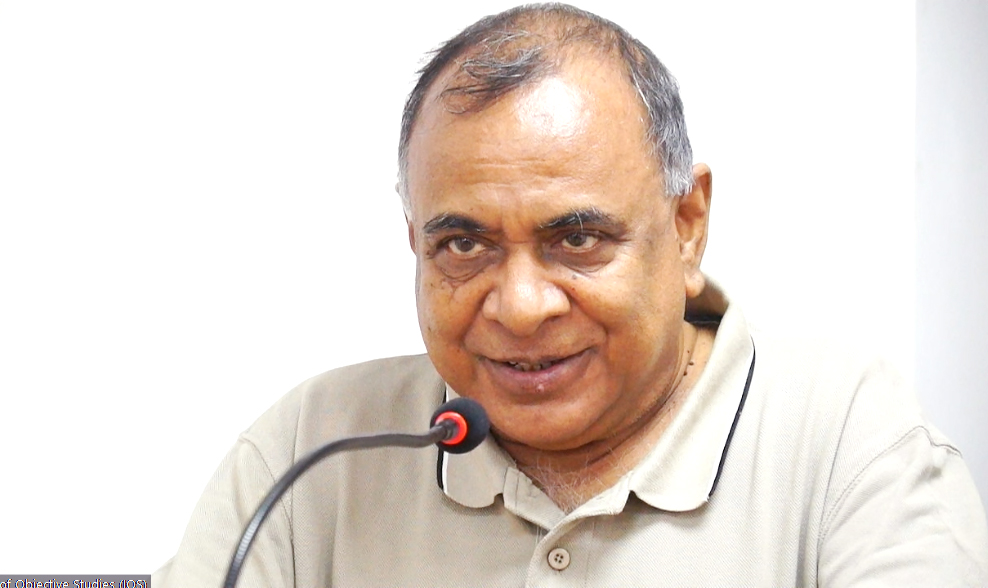
Senior Urdu journalist, A.U. Asif, said that Iftekhar Gilani was the best available person to speak about Mr. Noorani. He touched upon all the aspects of his life. He was one of the rare personalities who was quoted for his facts and figures. He did full justice to every topic he selected for writing. He suggested to Gilani to write a book on Mr. Noorani since he was very close to him. He noted that Mr. Noorani’s writings were very argumentative. But before his death, he would have made some more disclosures about the Babri Masjid.
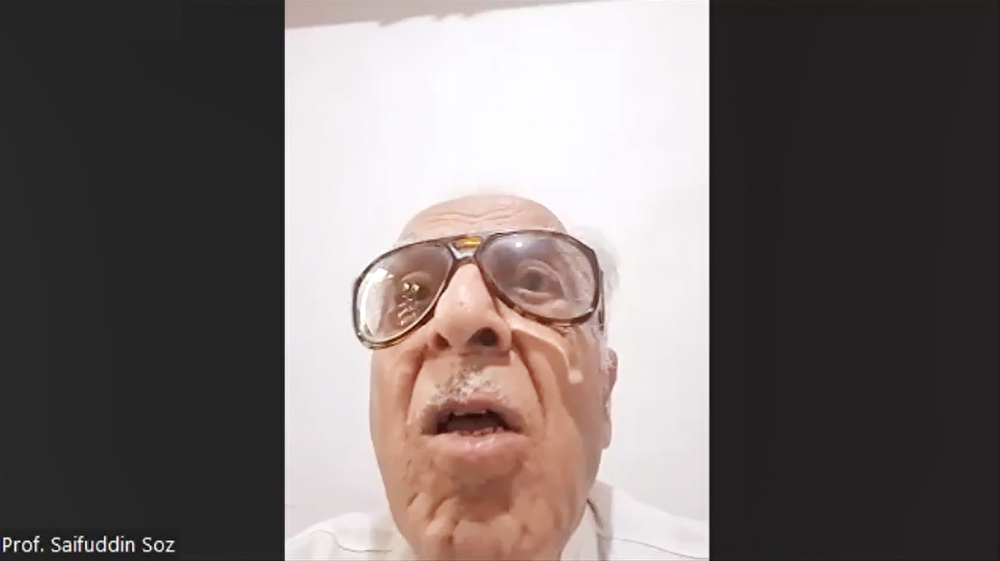
Senior Congress leader of Kashmir and former Union Minister, Prof. Saifuddin Soz observed that he knew him since the past three decades. He was a Qalandar (a spiritual person with inner higher knowledge) and an embodiment of truth. He had deep understanding of history. He wrote a book exclusively based Article 370 of the Constitution. His work on Kashmir was the last book he wrote. He said that Mr. Noorani boldly defended the self-determination demand of the Kashmiris. He spoke to powers—that—be and wrote to them without fear. He spoke truth so long as he was alive. His book on Article 370 was very voluminous. His death is a great loss to India, particularly Muslims. He was not given due respect and recognition which he deserved. He had a deep understanding of Indian Muslims and the Jammu and Kashmir Constitution. He said that he never come across a person of his stature. He was a person who could never be fixed. He equally loved Hindus, Muslims and other religions. Mr. Noorani was true to the core and led a life of a bold person, he concluded.
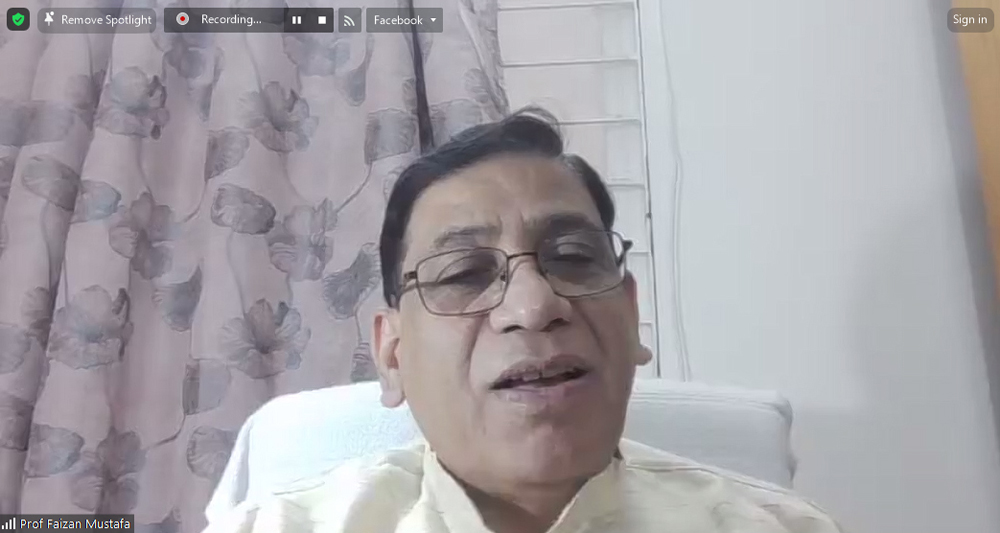
Vice-Chancellor of Chanakya National Law University, Patna, Prof. Faizan Mustafa commented that there were many prominent personalities in the last generation who had concern for the Millat. Mr. Noorani was one of them. He wrote extensively on almost every issue. His book on Indo-China relations was so critically written that several research scholars have done a Ph.D. on it. He also wrote on political trials, including the trial of the great Greek philosopher, Socrates. He said that “jury which tried the Socrates consisted of 501 members”. He also wrote on the trial of the last Mughal emperor, Bahadur Shah Zafar. Mr. Noorani wrote that Bahadur Shah Zafar’s trial was not fair because he was a sovereign and no British law could apply to him. Moreover, this case was not brought into the public domain. His trial was also not fair because it was conducted under the Evidence Act. He said that Mr. Noorani also wrote on the trial of the great martyr, Shaheed Bhagat Singh. His trail too was not fair. Mr. Noorani was unsparing in his analyses. According to him, all the decisions under Article 370 were illegal. He also wrote on the film “Censor Board. Prof. Mustafa added that he wrote on almost every issue before leaving this mundane world.
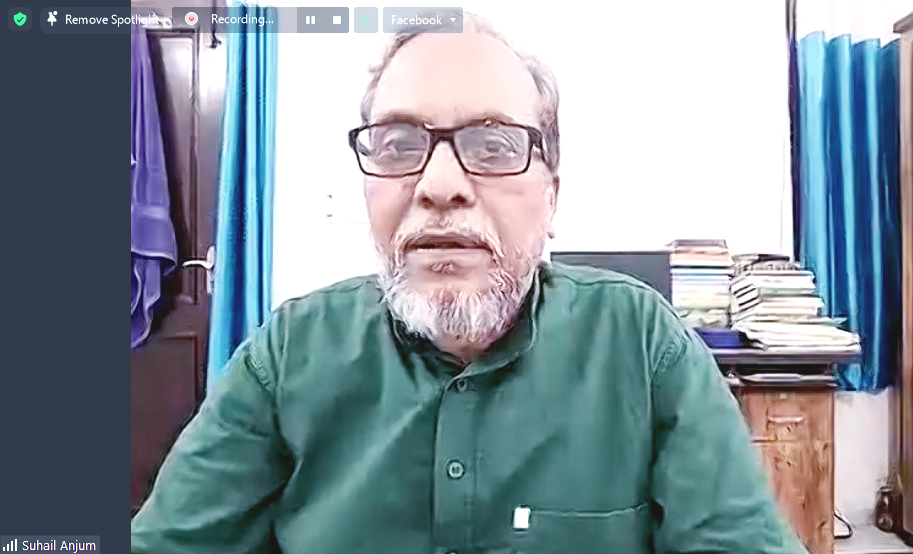
Senior journalist and Voice of America Urdu representative in India, Suhail Anjum described his death as a big loss to India in general and Muslim community in particular. There was no dearth of scholars in the country, but he was matchless in several respects. He was versatile as he touched upon almost all the important issues. He wrote on Babri Masjid and his articles were very analytical. In 2005, he interviewed the then president of Pakistan, General Pervez Musharraf which was published in the Frontline as a cover story. He was a regular contributor to several magazines and newspapers. Noorani never compromised on facts, he said.
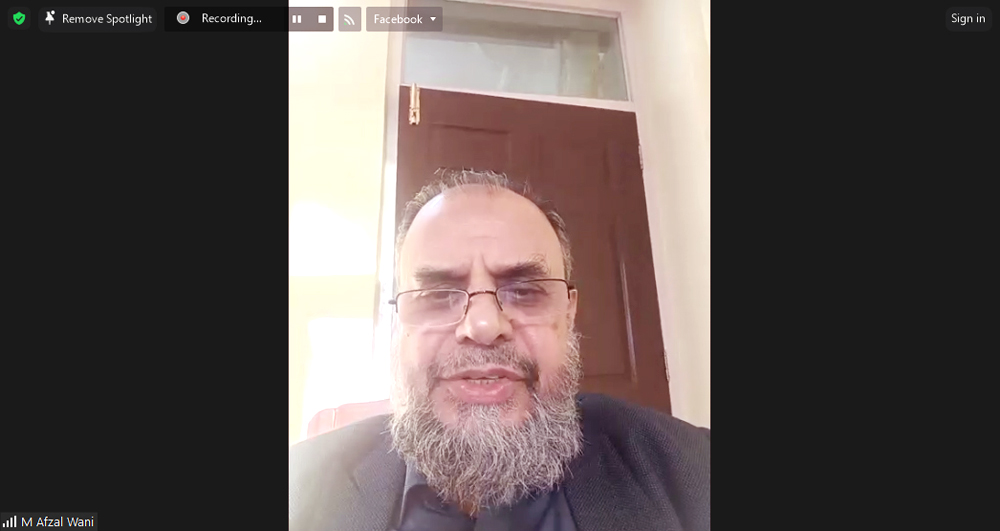
In his presidential remarks, the chairman of the IOS, Prof. M. Afzal Wani observed that many great scholars were born in pre-Independence era, and Mr. A.G. Noorani was one of them. He was witness to the making of the Constitution. Before 1947, people had envisioned that India would become a sovereign democratic republic in which every citizen should get his right. This was a mindset of the leaders who visualized India as free and democratic polity. It was their adroitness, courage and dexterity that so many ideas were put into the Constitution in order to make it a perfect and a compact law book of governance. Referring to Mr. A.G. Noorani’s contribution, he said that whenever he pleaded he did it for federalism. He always remained uncompromising. He used to highlight the basic foundations of the Constitution. He was an opinion maker of the Constitutional values. He loved the rule of law and human values. Justice Krishna Ayyar and A.G. Noorani were of the same ilk, he said. His personality could not be epitomized in a few adjectives. His thoughts and ideas did not concern one community, they were for all. He emphasized the need for developing a culture to nurture researchers. “As Muslim intellectuals, we should understand and research niceties of the issues. If any loophole is found, it should be plugged.” He said that Mr. Noorani had the capability to express the spirit of the Constitution through his pen. He had deep understanding and the spirit to view the Constitution in its right perspective. Indians wanted a comprehensive Constitution and a stable country which they secured, he concluded.
The condolence meet ended with dua, followed by a vote of thanks proposed by Prof. (Ms.) Haseena Hashia.
Go Back